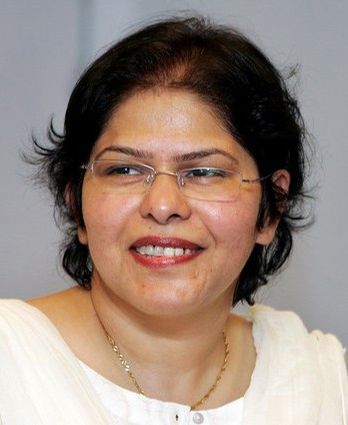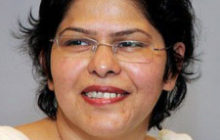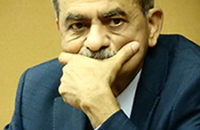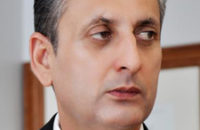by Dr. Ayesha Siddiqa
Remember when three blind men were asked to describe an elephant? Each one described the portion they touched. Much the same way, everyone seems to be finding their own answer to Hafiz Saeed’s recent house arrest—ranging from American pressure to a subtle Chinese nod. (Police placed him under house arrest on January 31 after taking him into custody at the headquarters of his charity, Jamaat-ud-Dawa in Lahore. Saeed is the alleged mastermind of the Mumbai attacks in 2008 that killed more than 160 people. The government says there isn’t sufficient evidence to indict him and he has denied all such charges.)
The timing of this development has spiced up speculation about why the action was taken and it has raised an important question on the future of Pakistan-based militant groups.Indeed, this is not the first time that Hafiz Saeed has been put under house arrest. He was locked up soon after the Mumbai attack. But since his last release on the orders of the Lahore High Court, the state and its intellectual agents were all on the forefront of defending his freedom (in fact, at one particular international conference in Islamabad one uniform-in-civvies type even defended Malik Ishaq of the Lashkar-e-Jhangvi outfit).
An effort was made to change Saeed’s image overnight from someone associated with a militant outfit to that of a religious but noble man, a Muslim version of Santa Claus who went around distributing welfare. The state stayed unwilling to implement UN resolution 1267 according to which Hafiz Saeed, his organization Lashkar-e-Taiba (LeT) and its new alias Jamaat-ud-Dawwa were seen as linked with terrorism. The American concern regarding LeT was not necessarily about Indian security but for its own people who died during the Mumbai attack or its men who in Afghanistan. The popular narrative in Pakistan, on the other hand, was always that the LeT was Kashmir-dedicated and had no links with the battle in Afghanistan.
But arresting the LeT/JuD leader was not a condition of UN Resolution 1267. It mainly demands that Pakistan impose a travel ban on several militant organizations, including the JuD and seal its bank accounts. Both actions were taken, which is one of the reasons why Pakistan was taken off the Financial Action Task Force (FATF) watch list in 2015. This is an inter-government body to monitor and stop money laundering, especially terrorist financing. In December 2016, the name of JuD’s student wing, the Al-Muhammadiya Student Association was put on the list of banned organizations.
However, sealing the bank accounts or imposing travel ban on a few people didn’t mean anything because the LeT network continued to operate under other names or conducted its business as usual. No one even bothered to ask how the LeT subsidiary or sister organizations continued to transact money even in the name of welfare. How did FIF, a sister organization of JuD, provide millions of rupees worth of medical assistance to 1.9 million people in 2016, start 3,410 water projects in Thar and Balochistan, carry out 3,621 rescue operations throughout the country and much more? Given the vast expanse of welfare activities, one of JuD’s Twitter accounts was able to boast that, “in a country where politicians were busy money laundering, Hafiz Saeed was busy collecting donations for orphans, victims, patients”.
Nonetheless, the question remains that given that Hafiz Saeed could not use the JuD accounts for collecting and distributing money for welfare, what channels did he or his banned organization use? Does it use banking channels under other names such as the account with the title ‘Balochistan Water Project’ No: 01707890001 at the Dubai Islamic Bank in Karachi that is also used to collect money for victims in Syria? The state’s cooperation is visible because it did not quiz the JuD or Jaish-e-Muhammad (JeM) about their source or channel of financing.
The latter continued to build its large madrassa in Bahawalpur, spread over more than 15 acres, purchase more land, and carry out other activities even though its accounts were sealed. Islamabad never got around to restricting the ability of militant organizations to carry out cross-border or internal financial transactions that could also result in money laundering, which is what the FATF wanted it to do. These organizations constantly deflected attention from the central entity to others.
For example, legally and organizationally, the FIF structure was separate from JuD, which would then allow Hafiz Saeed and his men to argue that FIF was mainly doing welfare and so it could not be restricted. Similarly, when attention was drawn towards JuD and LeT wall chalkings around Punjab in 2012 and 2013, it changed its label to ‘Tehreek-e-Azadi’. In this respect, the JuD is correct in claiming that ‘Tehreek-e-Azadi’ is not a new entity. However, its claim that this is a different entity can be debated since the wall chalking found at the same place as JuD’s graffiti in 2014 and 2015 had the same slogans.
This continued until, as some suggest, the fear of possible sanctions by the US may have motivated the security establishment to keep the LeT/JuD leader indoors. The US is a significant trade partner and the civil and military elite might both be apprehensive of the consequences since most have families there or have children studying in the US. The educated Pakistani elite and upper-middle class cannot afford to disconnect from access to the global financial system when it comes to education, especially in Western universities. Rawalpindi would like to remain connected with the West without taking note of the latter’s military-strategic compulsions, especially at a time when Pakistan is making a switch from an American to a Sino-Russian alignment. And even if we suppose this action were taken to impress President Donald Trump, the fact of the matter is that the symbolism of a house arrest might just be lost on him as Hafiz Saeed continues to reach out to the world and his followers on social media.
There are others who are inclined to think that the action was driven by a need to appease China. Recently, a Chinese newspaper reported divided opinion in Beijing’s establishment on the position taken by its government at the UN to constantly defend JeM’s Masood Azhar on Pakistan’s request. It is a popular perception encouraged by those who frequently visit the Chinese embassy that senior diplomats often voice discomfort with what they say is Pakistan’s continued support to certain militants. Beijing is concerned about the security of its soft underbelly, the Xinjiang region, and the need for peace and stability in the region where it is investing money.
But then the Chinese concern is not new. In the past decade, Beijing temporarily closed its borders on several occasions to discourage the flow of religious preachers and militants from Pakistan into its territory. There is nothing new or offensive that the LeT/JuD network seems to have done to attract this kind of attention from China or elsewhere. If anything, Rawalpindi has sold the idea to both the Russians and the Chinese that the Taliban and other friendly militants represent a safe counter-measure to Daesh/ISIS which is what Beijing, Moscow and the US are concerned about. With Trump in power, the priority is likely to shift away even further from Afghanistan unless it is about fighting the Islamic State.
Notwithstanding the Chinese concern for security, they have continued to operate relatively safely in Pakistan for years. If one were to go by the JuD’s claims, the organization has made inroads inside turbulent Balochistan and Sindh where peace is required from the perspective of the Chine Pakistan Economic Corridor. Furthermore, Beijing has communicated to religious and militant groups through its independent patronage structure. The stories of different mullahs and maulanas travelling to Beijing and back are now fairly old. In any case, the bulk of Pakistan-based religious-radical groups does not consider China an enemy.
Therefore, we need to re-think before jumping to the conclusion that the house arrest indicates a policy watershed. This may serve the purpose of signaling to the world the state’s ability to control these elements but it is not a precursor to a strategic change especially at a time when the geo-political plate seems to be in flux. At this juncture, militant groups may be viewed as vital assets that could even be loaned to big but friendly players in the Great Game.
Hafiz Saeed cannot be locked up at home for a very long time or be silenced metaphorically unless the state is willing to present a watertight case against him that could make him prosecutable in a court of law. Hafiz Saeed is too important, complex and integrated to be treated like Malik Ishaq. Nor is it that keeping him under house arrest will limit his capacity to carry out his operations.
Arguing that a policy shift on militancy is necessary in Pakistan’s interest is beyond doubt. But does the house arrest indicate barebones of a new policy? The answer is no. This may just be a tremor which also will pass.
Dr Siddiqa is an independent scholar and the author of Military Inc.: Inside Pakistan’s Military Economy (Pluto) whose second edition has just been published.

























